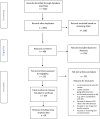Effectiveness of Motivational Interviewing on adult behaviour change in health and social care settings: A systematic review of reviews
- PMID: 30335780
- PMCID: PMC6193639
- DOI: 10.1371/journal.pone.0204890
Effectiveness of Motivational Interviewing on adult behaviour change in health and social care settings: A systematic review of reviews
Abstract
Background: The challenge of addressing unhealthy lifestyle choice is of global concern. Motivational Interviewing has been widely implemented to help people change their behaviour, but it is unclear for whom it is most beneficial. This overview aims to appraise and synthesise the review evidence for the effectiveness of Motivational Interviewing on health behaviour of adults in health and social care settings.
Methods: A systematic review of reviews. Methods were pre-specified and documented in a protocol (PROSPERO-CRD42016049278). We systematically searched 7 electronic databases: CDSR; DARE; PROSPERO; MEDLINE; CINAHL; AMED and PsycINFO from 2000 to May 2018. Two reviewers applied pre-defined selection criteria, extracted data using TIDIER guidelines and assessed methodological quality using the ROBIS tool. We used GRADE criteria to rate the strength of the evidence for reviews including meta-analyses.
Findings: Searches identified 5222 records. One hundred and four reviews, including 39 meta-analyses met the inclusion criteria. Most meta-analysis evidence was graded as low or very low (128/155). Moderate quality evidence for mainly short term (<6 months) statistically significant small beneficial effects of Motivational Interviewing were found in 11 of 155 (7%) of meta-analysis comparisons. These outcomes include reducing binge drinking, frequency and quantity of alcohol consumption, substance abuse in people with dependency or addiction, and increasing physical activity participation.
Conclusions: We have created a comprehensive map of reviews relating to Motivational Interviewing to signpost stakeholders to the best available evidence. More high quality research is needed to be confident about the effectiveness of Motivational Interviewing. We identified a large volume of low quality evidence and many areas of overlapping research. To avoid research waste, it is vital for researchers to be aware of existing research, and the implications arising from that research. In the case of Motivational Interviewing issues relating to monitoring and reporting fidelity of interventions need to be addressed.
Conflict of interest statement
The authors have declared that no competing interests exist.
Figures
References
-
- NICE. Behaviour change: individual approaches (PH49) London, UK2014. Available from: http://www.nice.org.uk/guidance/ph49/chapter/glossary#motivation.
-
- Michie S, Richardson M, Johnston M, Abraham C, Francis J, Hardeman W, et al. The behavior change technique taxonomy (v1) of 93 hierarchically clustered techniques: building an international consensus for the reporting of behavior change interventions. Ann Behav Med. 2013;46(1):81–95. 10.1007/s12160-013-9486-6 . - DOI - PubMed
-
- Heckhausen J, Hechhausen H. Motivation and Action. 2nd ed. UK: Cambridge University Press; 2010.
-
- Miller W, Rollnick S. Motivational Interviewing Helping People Change. 3rd ed. New York, USA: Guildford Press; 2013.
Publication types
MeSH terms
Grants and funding
LinkOut - more resources
Full Text Sources
Medical
Miscellaneous




